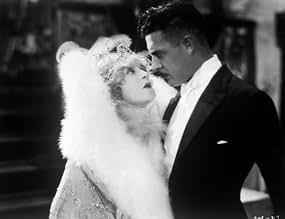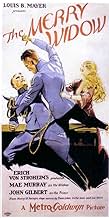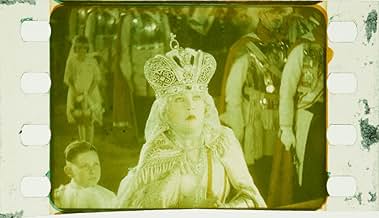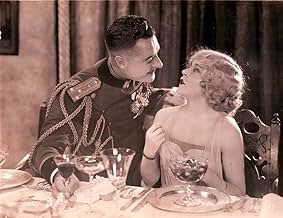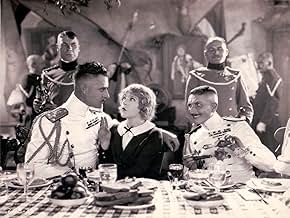IMDb RATING
7.2/10
2.7K
YOUR RATING
A prince must woo the now-wealthy dancer he once abandoned, to keep her money in the country in order to keep it from crashing economically.A prince must woo the now-wealthy dancer he once abandoned, to keep her money in the country in order to keep it from crashing economically.A prince must woo the now-wealthy dancer he once abandoned, to keep her money in the country in order to keep it from crashing economically.
- Awards
- 3 wins total
Gertrude Bennett
- Hard-Boiled Virginia
- (uncredited)
Bernard Berger
- Boy
- (uncredited)
Sidney Bracey
- Danilo's Footman
- (uncredited)
Estelle Clark
- French Barber
- (uncredited)
Albert Conti
- Danilo's Adjutant
- (uncredited)
D'Arcy Corrigan
- Horatio
- (uncredited)
Joan Crawford
- Ballroom Dancer
- (uncredited)
Xavier Cugat
- Orchestra Leader
- (uncredited)
Anielka Elter
- Blindfolded Musician
- (uncredited)
Dale Fuller
- Sadoja's Chambermaid
- (uncredited)
Clark Gable
- Ballroom Dancer
- (uncredited)
Featured reviews
The Merry Widow was first seen by American audiences on Broadway during the 1907-08 season where it ran for 416 performances. For those of us who know it primarily from the sound films with first Maurice Chevalier and Jeanette MacDonald and later Fernando Lamas and Lana Turner, this version will be quite interesting. Let's just say that what was put in the talkies was a lot closer to the stage production. Erich Von Stroheim who directed this film added quite a bit to the story. In fact in the end it isn't quite so merry.
Most of the film is taken up with just how Mae Murray became The Merry Widow. She's an American dancer who is stranded in the remote Balkan kingdom of Monteblanco which is ruled by King George Fawcett. In line for the throne is the rakish Roy D'Arcy, a Snidely Whiplash villain if there ever was one. Behind him is his cousin John Gilbert playing Prince Danilo.
Murray comes to the attention of both men, Gilbert actually falls for her, D'Arcy would like an occasional roll in the hay, but marry her? There's a third guy out there in Tully Marshall who is the wealthiest man in the kingdom and it's principal banker. He leaves and the whole place goes into receivership. Marshall's an old dude with some alternative sexual interests that Von Stroheim exploits to the fullest on screen and he'd like a young trophy wife and Murray fills the bill.
She does become a wife ever so briefly and then of course the Merry Widow having had her fill of royalty. But now that she holds the Monteblanco purse strings, D'Arcy has taken a renewed interest in her and maybe she just might be a suitable queen.
I think you can see where this is going though Von Stroheim does tease us a bit with some possible alternatives before the film concludes. The audience of 1925 saw one lavish production that nearly broke the new Metro-Goldwyn studio. We only see about half the footage he shot if that.
One thing that Metro did not have to worry about was a soundtrack. The music of The Merry Widow was very familiar to the American public and it's played on the organ throughout the film. Young contract players Joan Crawford and Clark Gable are extras in the ballroom scene and good luck in spotting them. Although in the Citadel film series book on The Films Of Clark Gable there is a still from The Merry Widow where Gable is pointed out.
I'm sure John Gilbert little dreamed that in six years Gable would be supplanting him as the number one leading man at MGM. But in The Merry Widow he's a stalwart and resolute Danilo and Mae Murray actually does suggest a bit of what Jeanette MacDonald's performance would be in the first sound remake.
In the fate of what happens to D'Arcy's character, Von Stroheim opts for some realism in terms of the European scene of the past 25 years or so before the film debuted. In fact very little of the happy tone of The Merry Widow is preserved here. The film given how Murray got her millions ought to be retitled, The Trophy Widow.
Still it's an interesting alternative to the normal operetta productions we're used to seeing.
Most of the film is taken up with just how Mae Murray became The Merry Widow. She's an American dancer who is stranded in the remote Balkan kingdom of Monteblanco which is ruled by King George Fawcett. In line for the throne is the rakish Roy D'Arcy, a Snidely Whiplash villain if there ever was one. Behind him is his cousin John Gilbert playing Prince Danilo.
Murray comes to the attention of both men, Gilbert actually falls for her, D'Arcy would like an occasional roll in the hay, but marry her? There's a third guy out there in Tully Marshall who is the wealthiest man in the kingdom and it's principal banker. He leaves and the whole place goes into receivership. Marshall's an old dude with some alternative sexual interests that Von Stroheim exploits to the fullest on screen and he'd like a young trophy wife and Murray fills the bill.
She does become a wife ever so briefly and then of course the Merry Widow having had her fill of royalty. But now that she holds the Monteblanco purse strings, D'Arcy has taken a renewed interest in her and maybe she just might be a suitable queen.
I think you can see where this is going though Von Stroheim does tease us a bit with some possible alternatives before the film concludes. The audience of 1925 saw one lavish production that nearly broke the new Metro-Goldwyn studio. We only see about half the footage he shot if that.
One thing that Metro did not have to worry about was a soundtrack. The music of The Merry Widow was very familiar to the American public and it's played on the organ throughout the film. Young contract players Joan Crawford and Clark Gable are extras in the ballroom scene and good luck in spotting them. Although in the Citadel film series book on The Films Of Clark Gable there is a still from The Merry Widow where Gable is pointed out.
I'm sure John Gilbert little dreamed that in six years Gable would be supplanting him as the number one leading man at MGM. But in The Merry Widow he's a stalwart and resolute Danilo and Mae Murray actually does suggest a bit of what Jeanette MacDonald's performance would be in the first sound remake.
In the fate of what happens to D'Arcy's character, Von Stroheim opts for some realism in terms of the European scene of the past 25 years or so before the film debuted. In fact very little of the happy tone of The Merry Widow is preserved here. The film given how Murray got her millions ought to be retitled, The Trophy Widow.
Still it's an interesting alternative to the normal operetta productions we're used to seeing.
Superb film by Erich von Stroheim who "personally directed" this lush and romantic blockbuster starring Mae Murray and John Gilbert.
Gilbert plays a European prince who falls for American "danseuse" Murray. Of course his leering cousin the Crown prince (Roy D'Arcy) also has a yen for blonde Murray. The boys clash but Murray prefers Gilbert until he is tricked into jilting her at the altar. She then marries the nation's leading banker (Tully Marshall) who has a foot fetish. He croaks of their wedding night and she becomes "The Merry Widow," a notorious party goer and high liver.
The lovers meet again at Maxim's in Paris where Murray pretends to prefer the oozing D'Arcy. Gilbert gets drunk. On a morning horse ride Murray and D'Arcy come across Gilbert sprawled drunk by the roadside. In a fit, Gilbert strikes the loathsome prince and is challenged to a duel. Murray races to the fog-ridden gunfest but Gilbert has already been shot.
Von Stroheim, notorious for his excesses in GREED is more constrained with THE MERRY WIDOW but still manages some startlingly decadent touches. Murray is fabulous as a the dancer and gets one whole routine to herself a la Martha Grahame as well as the striking and sensual waltz with Gilbert. Gilbert seethes with masculinity and lust for Murray. They are quite a couple. Von Stroheim gives each star maximum close-ups to great effect. Murray has two grand entrances: one in black gown and diamonds for a royal ball; a second all in white fur cape and feathers for her entrance at Maxim's.
The film is highly dramatic, romantic, and sensual but manages touches of humor. A real feast. George Fawcett is the old king; Josephine Crowell is the queen.
In 1925 John Gilbert would have been a shoe in for a best actor Oscar between his performances in THE MERRY WIDOW and THE BIG PARADE. Murray would likely have been a best actress contender. Great film.
Gilbert plays a European prince who falls for American "danseuse" Murray. Of course his leering cousin the Crown prince (Roy D'Arcy) also has a yen for blonde Murray. The boys clash but Murray prefers Gilbert until he is tricked into jilting her at the altar. She then marries the nation's leading banker (Tully Marshall) who has a foot fetish. He croaks of their wedding night and she becomes "The Merry Widow," a notorious party goer and high liver.
The lovers meet again at Maxim's in Paris where Murray pretends to prefer the oozing D'Arcy. Gilbert gets drunk. On a morning horse ride Murray and D'Arcy come across Gilbert sprawled drunk by the roadside. In a fit, Gilbert strikes the loathsome prince and is challenged to a duel. Murray races to the fog-ridden gunfest but Gilbert has already been shot.
Von Stroheim, notorious for his excesses in GREED is more constrained with THE MERRY WIDOW but still manages some startlingly decadent touches. Murray is fabulous as a the dancer and gets one whole routine to herself a la Martha Grahame as well as the striking and sensual waltz with Gilbert. Gilbert seethes with masculinity and lust for Murray. They are quite a couple. Von Stroheim gives each star maximum close-ups to great effect. Murray has two grand entrances: one in black gown and diamonds for a royal ball; a second all in white fur cape and feathers for her entrance at Maxim's.
The film is highly dramatic, romantic, and sensual but manages touches of humor. A real feast. George Fawcett is the old king; Josephine Crowell is the queen.
In 1925 John Gilbert would have been a shoe in for a best actor Oscar between his performances in THE MERRY WIDOW and THE BIG PARADE. Murray would likely have been a best actress contender. Great film.
Stroheim's take on the familiar story is filled with his customary pomp and spectacle while never losing sight of the love story at its core. It's something of a slog at over two hours long though, and Gilbert's royal prince comes across as something of a sleaze at times. However, Roy D'Arcy makes a wonderfully hissable villain as the scheming Crown Prince Mirko (a role von Stroheim originally ear-marked for himself).
"Manhattan Follies" dancer Mae Murray (as Sally O'Hara) attracts much male attention while touring the "Kingdom of Monteblanco," especially from sexually aggressive John Gilbert (as Danilo Petrovich) and Roy D'Arcy (as Prince Mirko). Soon, Mr. Gilbert's lunging leers turn to love, and Ms. Murray succumbs to his charms. However, Royal rulers Josephine Crowell (as Queen Milena) and George Fawcett (as King Nikita I) are against Gilbert's proposed marriage. Feeling jilted, Murray marries grotesque banker Tully Marshall (as Sixtus Sadoja), who promptly kicks the bucket. Newly rich, Murray becomes "The Merry Widow" of Paris. There, Mr. D'Arcy seems to win her affections, but Gilbert hasn't given up the courtship.
With this film, big-spending director Erich von Stroheim showed he could make an entertaining and innovative crowd-pleaser; his previous "Greed" (1924) had run over-budget (and over eight hours). But, although they had their hoped-for hit, MGM had also had enough of Mr. Stroheim; still, he departed on a high. "The Merry Widow" also helped rejuvenate Murray's fading career, albeit briefly. The cast is superlative, with D'Arcy essaying one of his most memorable roles. Perfectly representing Stroheim's famous foot fetish, Mr. Marshall is one of silent filmdom's forgotten treasures. Most of all, the flicker put Gilbert on the road to superstardom, which he cemented with a winning performance in "The Big Parade" (later in 1925).
Spotting Clark Gable and Joan Crawford as extras isn't as easy as counting Stroheim's foot references.
******** The Merry Widow (8/26/25) Erich von Stroheim ~ Mae Murray, John Gilbert, Roy D'Arcy, Tully Marshall
With this film, big-spending director Erich von Stroheim showed he could make an entertaining and innovative crowd-pleaser; his previous "Greed" (1924) had run over-budget (and over eight hours). But, although they had their hoped-for hit, MGM had also had enough of Mr. Stroheim; still, he departed on a high. "The Merry Widow" also helped rejuvenate Murray's fading career, albeit briefly. The cast is superlative, with D'Arcy essaying one of his most memorable roles. Perfectly representing Stroheim's famous foot fetish, Mr. Marshall is one of silent filmdom's forgotten treasures. Most of all, the flicker put Gilbert on the road to superstardom, which he cemented with a winning performance in "The Big Parade" (later in 1925).
Spotting Clark Gable and Joan Crawford as extras isn't as easy as counting Stroheim's foot references.
******** The Merry Widow (8/26/25) Erich von Stroheim ~ Mae Murray, John Gilbert, Roy D'Arcy, Tully Marshall
Erich von Stroheim has played a neat little trick with 'The Merry Widow'. The first half of the movie plays out like a quirky royal-romance comedy. There are plenty of scenes and gags that could belong to the best comedic works of Howard Hawks. In the second half, the tone changes into more melodramatic, yet the tonal change doesn't take the viewer out of the movie. It actually gives that perfect feel of a mental hangover after the pure love has been ripped into shreds by the cruel world. But the whole film has some sinister undertone - like something is about to happen, but you can't be sure, what it is. Von Stroheim constantly leads his viewers somewhere, allows them to guess, and then - BAM.
John Gilbert is likable as charming Prince Danilo. Mae Murray balances between hammy and sometimes very good performance (someone said, that von Stroheim made actress out from Murray). But Roy D'Arcy is hamming his Crown Prince Mirko up. In a good way. His portrayal of a monocle-wearing sleazy villain blows all previous Erich von Stroheim's performances out of the water.
Like any other von Stroheim's movie, 'The Merry Widow' also suffered from studio interference (some scenes that were cut were quite steamy, probably even for today's standards). I would want to say that 'The Merry Widow' is von Stroheim's weakest work, but again, we can't see his whole vision. The sets are beautiful. Camerawork and editing also something of their own league. Again, you have to admire von Stroheim's attention to small details - lecherous Baron Sadoja's obsession with women's legs, who himself has sick legs.
John Gilbert is likable as charming Prince Danilo. Mae Murray balances between hammy and sometimes very good performance (someone said, that von Stroheim made actress out from Murray). But Roy D'Arcy is hamming his Crown Prince Mirko up. In a good way. His portrayal of a monocle-wearing sleazy villain blows all previous Erich von Stroheim's performances out of the water.
Like any other von Stroheim's movie, 'The Merry Widow' also suffered from studio interference (some scenes that were cut were quite steamy, probably even for today's standards). I would want to say that 'The Merry Widow' is von Stroheim's weakest work, but again, we can't see his whole vision. The sets are beautiful. Camerawork and editing also something of their own league. Again, you have to admire von Stroheim's attention to small details - lecherous Baron Sadoja's obsession with women's legs, who himself has sick legs.
Did you know
- TriviaWhile filming the climactic ballroom scene, Erich von Stroheim noticed an extra whose costume was not adjusted to his liking. He stepped off the high camera platform on which he was standing, fell, and broke his leg. He directed the rest of the film from a reclining chair while his leg healed.
- GoofsA title card reads "a prince has a duty to his country higher then [sic] his duty to himself" - a grammatical error unusual for such a prestigious studio as MGM.
- Quotes
Prince Danilo Petrovich: Where the devil did you get these pictures?
Danilo's Adjutant: From my barber--he said he got them in Paris.
- Crazy creditsThe credits state that the film is "personally directed by" Erich von Stroheim.
- Alternate versionsThe version shown on the Turner Classic Movies (TCM) channel has the musical score arranged by Dennis James and performed by him on a Möller pipe organ. It is shown at a proper silent movie speed and runs 137 minutes.
- ConnectionsEdited into Histoire(s) du cinéma: Seul le cinéma (1994)
- How long is The Merry Widow?Powered by Alexa
Details
- Release date
- Country of origin
- Language
- Also known as
- The Merry Widow
- Filming locations
- Production companies
- See more company credits at IMDbPro
Box office
- Budget
- $592,000 (estimated)
- Runtime
- 2h 17m(137 min)
- Color
- Sound mix
- Aspect ratio
- 1.33 : 1
Contribute to this page
Suggest an edit or add missing content

